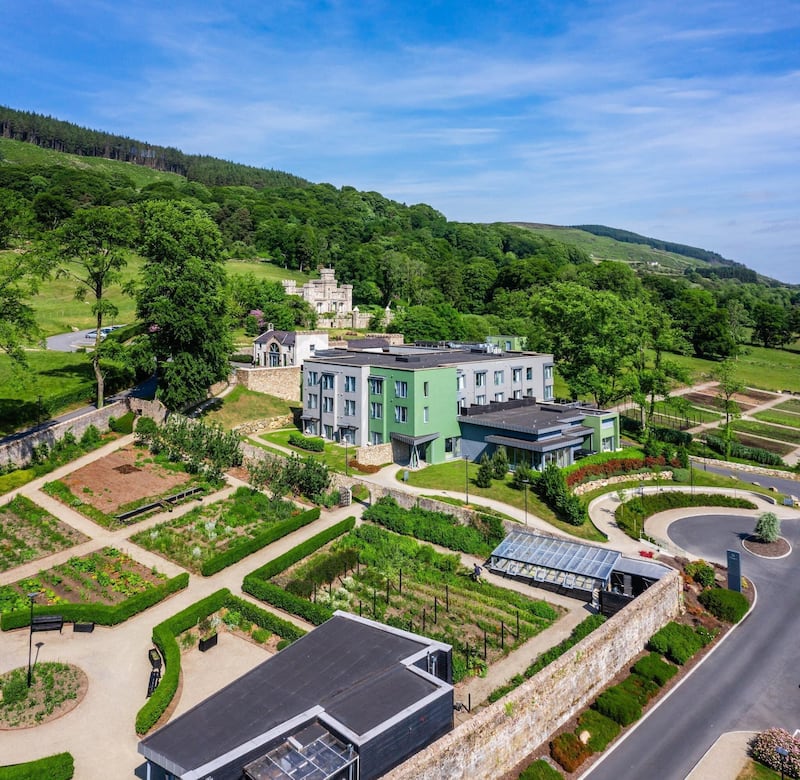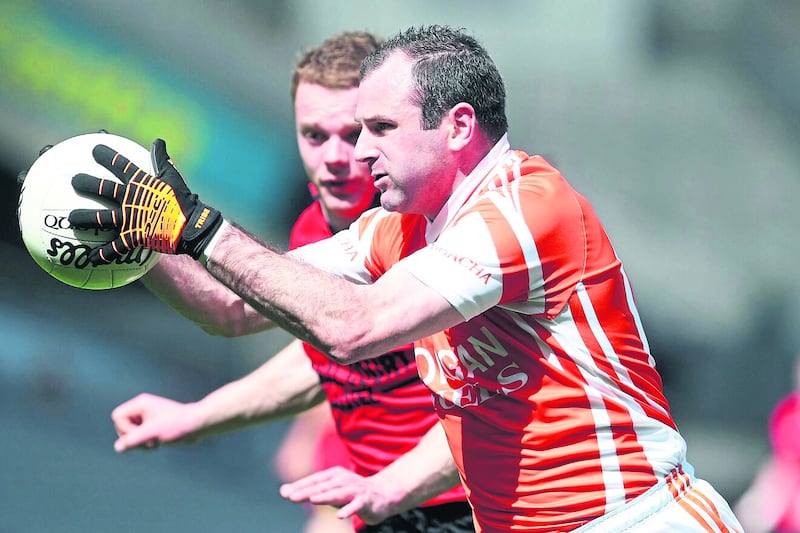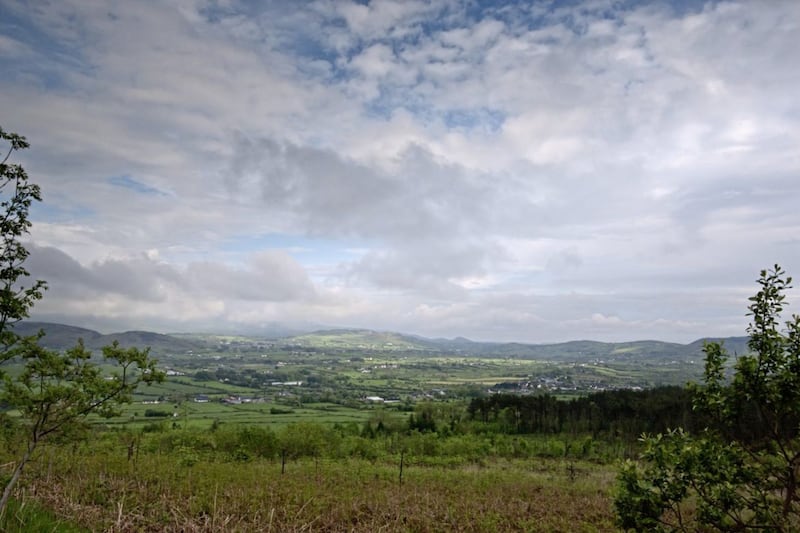As he surveys all before, perusing the 365-acre estate he owns in south Armagh, Mick Boyle really is King of the Castle . . .
He and his wife Robin are joint owners of the historic Killeavy Castle on the slopes of Slieve Gullion, which they won at auction in March 2013 for £1.19 million when it was a crumbling wreck, and which in just a decade they have painstakingly converted from dilapidation to delight.
They’ve since gone on to invest the thick end of another £12m into the property, and today the couple are rightly basking in plaudit after plaudit in both the realms of tourism and sustainability as the four-star boutique hotel, spa and castle destination in what was once one of the north’s least desirable areas picks up awards on an almost monthly basis.
Mick’s story really is one of triumph, about how his family left their homeland for Australia in 1968 with little other than the clothes they stood up in, yet whose work ethic stood them in great stead and allowed them to return half a century later to fulfil an ambition to restore a Grade A-listed 19th-century castle that hadn’t been inhabited for more than a decade.
“It wasn’t easy, and we couldn’t always see the finish line, but here we are,” says Mick as he takes me on a guided tour through every nook and cranny of a castle which started life as a country farm house, built in a gothic style by the Foxall family between 1810 and 1820.
In 1836, Powell Foxall commissioned the Dublin-based architect George Papworth to extend the building, adding four stone towers, outbuildings and Tudor-style windows.
The extended 4,000 sq ft house then became known as Killeavy Castle.
- Killeavy Castle named Best Irish Luxury Hotel at awards ceremonyOpens in new window
- Travel with Rory King: Why Killeavy Castle is my favourite Irish hotelOpens in new window
- Over 200 acres of native woodland in south Armagh to be regeneratedOpens in new window
- Work begins soon on converting historic Killeavy Castle into luxury 42-bed hotelOpens in new window
The property had been in the Bell family ownership since the late 1800s, and when the last remaining Bell family member left the castle in the 1990s as she was unable to pay for the upkeep of the castle itself (she died in 2001), vandals were able to run amok, ransacking the building, stripping the lead from its roof and destroying many of its historic features.
“It was a shame how it fell into such a shocking state,” Mick says.
He and his parents Michael and Pauline, who’d both been born in Killeavy during the 1930s, had left south Armagh in 1968 to seek a new life in Australia.
Like thousands of people from Britain and Ireland, they were attracted Down Under on the lure of a better house, better job prospects and better quality of life for just a £10 one-way ticket (the story was dramatised earlier this year in the ‘Ten Pound Poms’ series on the BBC).
But the Boyles, like many of their fellow travellers, soon learnt that life in Australia was not like the glossy brochures promised.
“At four-and-a-half years old, I was the oldest of three children when we headed away on a ship, with mainly Italians and Greeks,” Mick recalls.
“We were put up in an old army camp in western Sydney, where we had half a nissen hut, all of us in one big curvy room and no cooking facilities. There was a mess where we went with a tray for our food. There was a big fence around us. I started school on that camp too.
“We had to stay for two years, otherwise you had to pay for your way back home as well as your outwards journey, so it cost you both ways. We didn’t have a chance of doing that.
“What I remember vividly about that first day when we berthed in Sydney was that my dad was excited, but my mum was so scared.”

No wonder. His mother Pauline (nee Rice) was more than seven months pregnant with the Boyles’ four child (they had seven in all), and they knew nobody.
“But like many strong women of that time, mum just got on with it,” Mick says.
He studied civil engineering at Sydney University, and returned to South Armagh in 1985 to celebrate his 21st birthday with newly met relatives in Cloughoge.
Mick liked what he saw and returned in 1989 with his Australian girlfriend (now his wife) Robin Craig, where they explored the local area, including Slieve Gullion and the Mourne Mountains, in an era when British soldiers were dug in and army checkpoints were part of everyday life.
But he and Robin liked what they saw and wanted to preserve the Boyle heritage in that area, so when the castle came up for sale via auction, he simply had to have it.
They had established and own the successful Australian construction company Abergeldie Complex Infrastructure, which today has 1,000 employees.
“I remember waking my wife up in the middle of the night in Sydney and was so excited to tell her we’d won the auction,” he says.
That, however, was just the start of a painstaking period restoring Killeavy Castle to its former glory.
“The vision was to make Killeavy Castle and hotel one of Ireland’s must-see destinations. The Ring of Gullion countryside is an area of outstanding natural beauty, and the setting of Killeavy Castle within it is no less than breathtaking.
“We wanted it to become the jewel of South Armagh and be a special destination for people from all over the world - and I believe we’re on the right path,” Mick added.
They have developed a 45-room boutique hotel, restaurant and spa, with additional accommodation in the Gatelodge and Castle plus a permanent pavilion adjacent to the castle for events. It provided jobs for around 100 people.

It opened in 2019, when the ribbon was officially cut by Michael Boyle senior and Pauline Boyle half a century since they’d set sail for a better life.
“Of course, after all our hard work, we then had Covid, which decimated the tourist industry and set us back. But we’re now back on our feet,” Mick says
The Boyles’ story is also creating a positive impact on the area that is their second home.
Robin is an ardent advocate for sustainability, and the estate is now a model of how luxury and environmental stewardship can coexist.
The estate’s sustainable achievements include a comprehensive zero-waste food programme, a strict no single-use plastic policy, and extensive recycling initiatives, as well as investing in sustainable energy solutions throughout the hotel.
Killeavy Castle estate has also embarked on an ambitious £1.5 million landscape restoration project in the surrounding Slieve Gullion area, demonstrating a profound commitment to environmental preservation and is on track to achieve its ambitious goal of reaching carbon neutrality by early in 2025.
Robin says: “We believe that sustainability is not just an initiative, but a way of life, and we are committed to continuing our journey towards a greener future, inspiring others in the hospitality industry to follow suit.”





